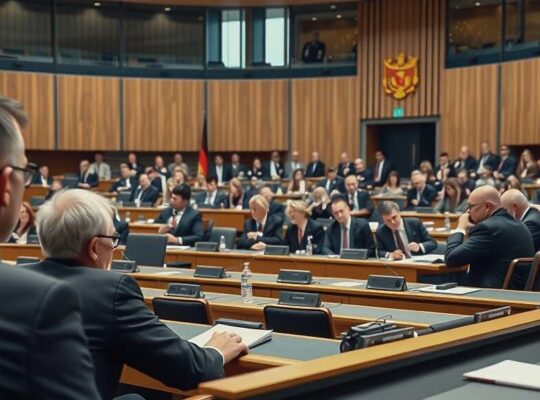The recent heart attack suffered by Sören Pellmann, parliamentary group leader of the Left party, has ignited a critical debate within German politics, forcing a reckoning with the culture of overwork and pervasive stress that defines the profession. Pellmann’s experience, detailed publicly, underscores a worrying trend and raises questions about the long-term sustainability and health of those in positions of power.
Just weeks after a series of engagements in North Rhine-Westphalia, Pellmann experienced acute chest pain, culminating in a heart attack and subsequent emergency surgery involving the insertion of a stent. What began as a pressure sensation escalated rapidly, with his smartwatch registering an alarming heart rate of 159. His decision to speak openly about the episode, initially fraught with internal doubts and concerns about appearing “weak” or vulnerable, reflects a broader recognition that silence surrounding health issues within the political sphere is detrimental.
Pellmann’s account aligns with a growing pattern, notably following recent retirements from high-profile figures like former SPD General Secretary Kevin Kühnert and SPD MP [Name withheld, as not provided], both citing health concerns as contributing factors. The inherent demands of a political career – characterized by “unhealthy, irregular nutrition, insufficient exercise and stress” – are difficult to reconcile with a sustainable lifestyle, particularly under the current operational framework. The typical parliamentary week, according to Pellmann, sees MPs juggling “ten, eleven, twelve appointments a day, without breaks or respite” hurtling between meetings and parliamentary debates. The expectation of constant availability, amplified by social media, further exacerbates the pressure.
A concerning aspect highlighted by Pellmann is the normalization of alcohol consumption within political settings. The constant cycle of receptions and social events frequently involves alcohol, creating a subtle pressure to conform. Refusing alcoholic beverages, Pellmann notes, can even be interpreted negatively, triggering accusations of being a “buzzkill” or suggesting a deeper problem. This culture, he believes, likely masks a “significant number of politicians developing dependencies.
The initial resistance to his decision to disclose his health struggle-with colleagues warning against portraying weakness-demonstrates the deeply ingrained reluctance within the political establishment to acknowledge vulnerability. Despite these reservations, the overwhelmingly positive response he received online and within the parliamentary group suggests a shifting perspective, with many expressing well wishes and even soliciting advice on weight loss. However, the underlying problem remains: the deeply ingrained culture of overwork and relentless pressure that threatens the wellbeing of those tasked with leading and representing the nation. The need for systemic change and a more supportive environment for politicians, prioritizing health and well-being over relentless ambition, is now undeniable.












